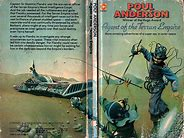The note, "Spica," means that I had recently posted about Spica but then read some more about it. There is quite a lot. See Spica.
Some notes have already become the bases of subsequent posts, e.g., about Catawrayannis Base and a Moslem-Buddhist synthesis.
I find ten quoted phrases about "wind." Either Poul Anderson is writing a detailed nature description or he is using the wind to comment on the action of the story or maybe both. We can study these passages but not tonight, thank you. After that, I will have exhausted posts drafted or notes taken while off line and will just have to do some more reading.
Onward, Earthlings.

8 comments:
Kaor, Paul!
A Catholic might insist: "Three Persons in the one Godhead."
Ad astra! Sean
Sean,
Yes. I carefully wrote "three divine persons," not "three gods."
Paul.
Kaor, Paul!
Good! But some people don't understand what Nicene Christians mean by the revelation of the Trinity.
Ad astra! Sean
Re Spica: That star is important in the "Antares Dawn" series of novels by Michael McCollum. As one of the brighter stars in Earth's sky I would expect it to be part of many SF stories.
Re Trinity: When I read C.S. Lewis' "Mere Christianity" I was not convinced by his argument for the existence of God, but I was mildly impressed by him expressing the Trinity in a way that wasn't self-contradictory.
Jim,
I read all of Lewis' theology a very long time ago. Can you remember how he expressed the Trinity?
Paul.
Kaor, Jim!
Dang! I keep forgetting to look up Michael McCollum's stories. Been rereading the NT lately, finished the Gospels and I'm now reading the Acts of the Apostles. Which some commentators called the Gospel of the Holy Spirit.
I've read MERE CHRISTIANITY, but so long ago that I don't recall how Lewis
argued for the existence of God.
I think the best succinct explication of the Trinity I read was the Athanasian Creed.
Ad astra! Sean
Note: I keep forgetting to find the 3rd book in the Antares series, which came out many year after the 2nd. I should be able to find an e-book version.
It is a long time ago that I read "Mere Christianity" but to the best of my recollection:
Lewis' argument for God was based on common morality in human cultures. I found this weak because there *are* differences in morality between cultures and because the common elements of morality can be simply what works to keep your tribe alive and well, ie: convergent cultural evolution, with no need for God inserting those morals into all humans.
IIRC Lewis' analogy for the Trinity: he imagined one book on top of another with God the Father being more basic, Jesus being secondary, and the Holy Spirit being the combination. Not obviously true, but not obviously self-contradictory either.
Kaor, Jim!
I'm inclined to agree with your critique of Lewis' argument for the existence of God: it's too simplistic. At the same time I do believe in what some philosophers and theologians call Natural Law: certain universals of morality deducible by reason alone and found among all humans and human cultures. Examples being the penalizing of crimes like murder and theft.
And that's why monstrosities like "legalized" abortion outrages so many--it's a violation of justice. It's the murder of the weakest and most helpless of human beings.
I find Lewis' analogy for the Trinity unsatisfactory--too simplistic. But I realize he wrote MERE CHRISTIANITY as an effort to explain the most basic Christian doctrines as simply as possible.
Ad astra! Sean
Post a Comment